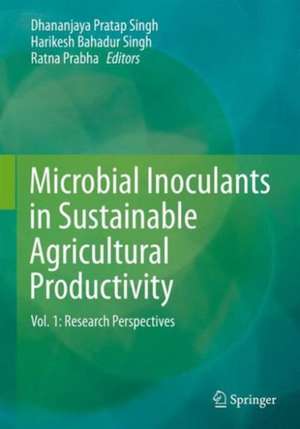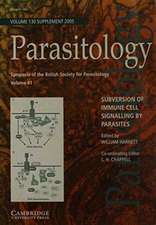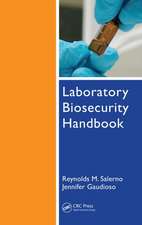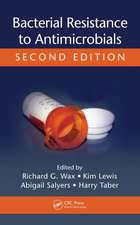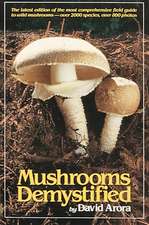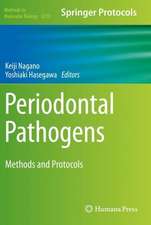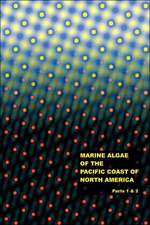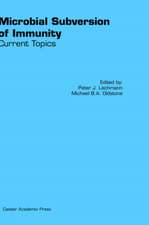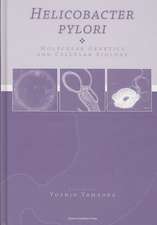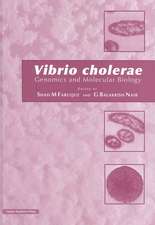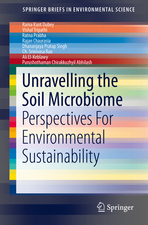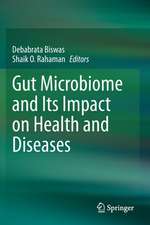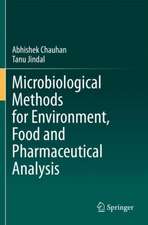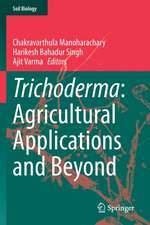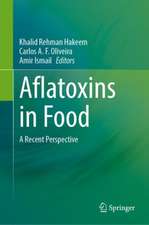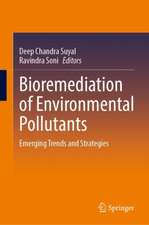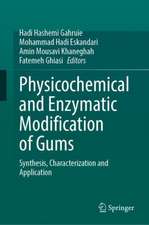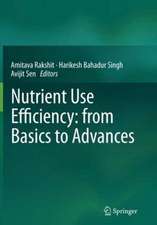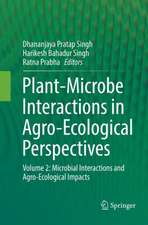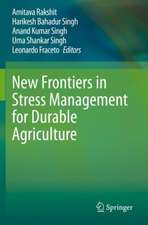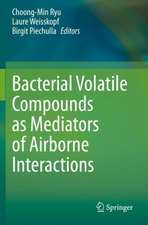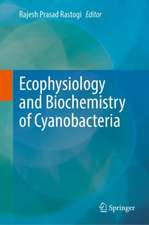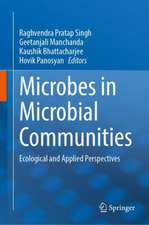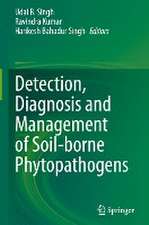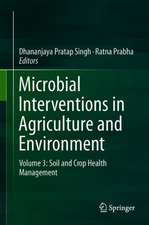Microbial Inoculants in Sustainable Agricultural Productivity: Vol. 1: Research Perspectives
Editat de Dhananjaya Pratap Singh, Harikesh Bahadur Singh, Ratna Prabhaen Limba Engleză Hardback – 4 mar 2016
The first volume of the book Microbial Inoculants in Sustainable Agricultural Productivity - Research Perspectives highlights the efforts of global experts with regard to various aspects of microbial inoculants. Emphasis is placed on recent advances in microbiological techniques for the isolation, characterization, identification and evaluation of functional properties using biochemical and molecular tools. The taxonomic characterization of agriculturally important microorganisms is documented, along with their applications in field conditions.
The book exploresthe identification, characterization and diversity analysis of endophytic microorganisms
in various crops including legumes/ non-legumes, as well as the assessment of their beneficial impacts in the context of promotingplant growth. Moreover, it provides essential updates onthe diversity and role of plant growth promoting rhizobacteria (PGPR) and arbuscular mycorrhizal mycorrhizal fungi (AMF). Further chaptersexamine in detailbiopesticides, thehigh-density cultivation of bioinoculants in submerged culture, seed biopriming strategies for abiotic and biotic stress tolerance, andPGPR as abio-control agent. Given its content,the bookoffers a valuable resource for researchers involved in research and development concerningPGPR, biopesticides and microbial inoculants.
| Toate formatele și edițiile | Preț | Express |
|---|---|---|
| Paperback (2) | 795.56 lei 39-44 zile | |
| Springer India – 7 apr 2018 | 795.56 lei 39-44 zile | |
| Springer India – 25 apr 2018 | 1144.91 lei 39-44 zile | |
| Hardback (2) | 835.62 lei 39-44 zile | |
| Springer India – 4 mar 2016 | 835.62 lei 39-44 zile | |
| Springer India – 7 apr 2016 | 1170.25 lei 39-44 zile |
Preț: 835.62 lei
Preț vechi: 1099.50 lei
-24% Nou
Puncte Express: 1253
Preț estimativ în valută:
159.90€ • 170.98$ • 133.32£
159.90€ • 170.98$ • 133.32£
Carte tipărită la comandă
Livrare economică 14-19 aprilie
Preluare comenzi: 021 569.72.76
Specificații
ISBN-13: 9788132226451
ISBN-10: 8132226453
Pagini: 345
Ilustrații: XVIII, 343 p. 37 illus., 25 illus. in color.
Dimensiuni: 178 x 254 x 26 mm
Greutate: 1.28 kg
Ediția:1st ed. 2016
Editura: Springer India
Colecția Springer
Locul publicării:New Delhi, India
ISBN-10: 8132226453
Pagini: 345
Ilustrații: XVIII, 343 p. 37 illus., 25 illus. in color.
Dimensiuni: 178 x 254 x 26 mm
Greutate: 1.28 kg
Ediția:1st ed. 2016
Editura: Springer India
Colecția Springer
Locul publicării:New Delhi, India
Cuprins
1. Strategies for Characterization of Agriculturally Important Bacteria.- 2. Microbial Inoculants as Agents of Growth Promotion and Abiotic Stress Tolerance in Plants.- 3. A Renaissance in Plant Growth Promoting and Biocontrol Agents by Endophytes.- 4. Omics-driven Approaches in Plant–Microbe Interaction.- 5. Strategies for Taxonomical Characterization of Agriculturally Important Microorganisms.- 6. Microbial Inoculants: Identification, Characterization and Applications in the Field.- 7. Endophytic Microbes in Crops: Diversity and Beneficial Impact for Sustainable Agriculture.- 8. Exploiting PGPR and AMF Biodiversity for Plant Health Management.- 9. Biopesticides: An Ecofriendly Approach for the Control of Soil-borne Pathogens in Peanut.- 10. Strategies for High Density Cultivation of Bio-inoculants in Submerged Culture with Special Reference to Pseudomonads.- 11. Microbial Inoculants as Biofertilizers and Biopesticides.- 12. Seed Bio-priming for Biotic and Abiotic Stress Management.-13. Azotobacter - PGPR Activities with Special Reference to Effect of Pesticides and Biodegradation.- 14. Beneficial effects and molecular diversity of endophytic bacteria in legume and non legumes.- 15. Pseudomonas fluorescent: A promising biocontrol agent and PGPR for sustainable agriculture.- 16. Isolation, Characterization of Nematode Controlling Bacteria and Fungi from Nature.- 17. Ecofriendly Plant Growth Promoting Rhizobacteria for Crop Improvement.- 18. Microbial inoculants as Biofertilizer.- 19. Microbial Inoculant: Modern Era of Fertilizers and Pesticides.
Recenzii
“The book does a good job of highlighting various aspects of microbial inoculants (including PGPR and AMF) for their beneficial impacts on plant growth promotion, thus playing an important role in agriculture sustainability. … this book is an excellent scientific contribution describing microbial agents for sustainable farming, and outlines pathways towards next-generation ideal microbial inoculants with superior application strategies. In our view, this book can be recommended to anyone interested in sustainable agricultural production.” (Jay Shankar Singh, P. C. Abhilash, and Vijai K. Gupta, Trends in Biotechnology, Vol. 34 (773), October, 2016)
Notă biografică
Dhananjaya P. Singh is presently Senior Scientist (Biotechnology) with ICAR-National Bureau of Agriculturally Important Microorganisms, Indian Council of Agricultural Research, India at Maunath Bhanjan, India. He did his Masters degree from G.B. Pant University of Agriculture & Technology, Pantnagar, India and Ph. D. in Biotechnology from Banaras Hindu University, India. His research interests lies in bioprospecting of metabolites, microbe-mediated stress management in plants, metabolomics-driven search for small molecules and bioinformatics. He has been engaged with the development of supercomputational infrastructure for agricultural bioinformatics at ICAR-NBAIM under National Agricultural Bioinformatics Grid project of ICAR. He has overall 112 publications including 60 research papers, two edited books, 22 book chapters, 20 popular articles, 15 reviews and one Indian Patent to his credit.
Harikesh B. Singh is presently Professor & Head, Department of Mycology and Plant Pathology at Institute of Agricultural Sciences, Banaras Hindu University. He served the State Agriculture University, Central University and CSIR Institute in teaching, research and extension roles. His major research focus is on bioinnoc
ulats, biological control of plant pathogens and nano-biotechnology. In recognition of Prof. Singh’s scientific contributions and leadership in the field of plant pathology, he was honored with several prestigious awards, notable being CSIR Technology Prize for Biological Sciences, Vigyan Bharti Award, Prof. V.P. Bhide Memorial Award, Society for Plant Research, Scientist of Excellence Awards, BRSI Industrial Medal Award, Jyoti Sangam Award, Akshyavat Samman, Distinguish Scientist Award by Society for Research Development in Agriculture, Prof. Panchanan Maheshwari Medal by Indian Botanical Society, Rashtriya Gaurav Award by IIFS, Plant Pathology Leader Award by IPS, CSIR Award for S&T Innovation for Rural Development (CAIRD), Environment Conservation Award, Vigyan Ratna by UP Council of Science and Technology. Dr. Singh has been the Fellow of National Academy of Agricultural Sciences. Professor Singh has written two books, several training modules/ manuals and more than 275 publications and has more than 18 US patents and 3 PCTs to his credit.
Ratna Prabha has obtained her Master's degree in Bioinformatics from Banasthali Vidyapeeth, Rajasthan and Doctorate in Biotechnology from Mewar University, India. She is presently associated with ICAR- National Bureau of Agriculturally Import
ant Microorganisms, India in Network Project for Agricultural Bioinformatics and Computational Biology of Indian Council of Agricultural Research. Dr Prabha has been engaged in developing various bioinformatics digital databases on plants and microbes, published 14 research papers in the journals of International repute and 06 book chapters. Her current research interest lies in microbe-mediated stress management in plants, database development, comparative microbial genome analysis, phylogenomics and pangenome analysis of prokaryotic genomes. She has completed several bioinformatics demonstration tasks at different National training programs on bioinformatics and computational biology.
Harikesh B. Singh is presently Professor & Head, Department of Mycology and Plant Pathology at Institute of Agricultural Sciences, Banaras Hindu University. He served the State Agriculture University, Central University and CSIR Institute in teaching, research and extension roles. His major research focus is on bioinnoc
ulats, biological control of plant pathogens and nano-biotechnology. In recognition of Prof. Singh’s scientific contributions and leadership in the field of plant pathology, he was honored with several prestigious awards, notable being CSIR Technology Prize for Biological Sciences, Vigyan Bharti Award, Prof. V.P. Bhide Memorial Award, Society for Plant Research, Scientist of Excellence Awards, BRSI Industrial Medal Award, Jyoti Sangam Award, Akshyavat Samman, Distinguish Scientist Award by Society for Research Development in Agriculture, Prof. Panchanan Maheshwari Medal by Indian Botanical Society, Rashtriya Gaurav Award by IIFS, Plant Pathology Leader Award by IPS, CSIR Award for S&T Innovation for Rural Development (CAIRD), Environment Conservation Award, Vigyan Ratna by UP Council of Science and Technology. Dr. Singh has been the Fellow of National Academy of Agricultural Sciences. Professor Singh has written two books, several training modules/ manuals and more than 275 publications and has more than 18 US patents and 3 PCTs to his credit.
Ratna Prabha has obtained her Master's degree in Bioinformatics from Banasthali Vidyapeeth, Rajasthan and Doctorate in Biotechnology from Mewar University, India. She is presently associated with ICAR- National Bureau of Agriculturally Import
ant Microorganisms, India in Network Project for Agricultural Bioinformatics and Computational Biology of Indian Council of Agricultural Research. Dr Prabha has been engaged in developing various bioinformatics digital databases on plants and microbes, published 14 research papers in the journals of International repute and 06 book chapters. Her current research interest lies in microbe-mediated stress management in plants, database development, comparative microbial genome analysis, phylogenomics and pangenome analysis of prokaryotic genomes. She has completed several bioinformatics demonstration tasks at different National training programs on bioinformatics and computational biology.
Textul de pe ultima copertă
How to achieve sustainable agricultural production without compromising environmental quality, agro-ecosystem function and biodiversity is a serious consideration in current agricultural practices. Farming systems’ growing dependency on chemical inputs (fertilizers, pesticides, nutrients etc.) poses serious threats with regard tocrop productivity, soil fertility, the nutritional value of farm produce, management of pests and diseases, agro-ecosystem well-being, and health issues for humans and animals. At the same time, microbial inoculants in the form of biofertilizers, plant growth promoters, biopesticides, soil health managers, etc. have gained considerable attention among researchers, agriculturists, farmers and policy makers.
The first volume of the book Microbial Inoculants in Sustainable Agricultural Productivity - Research Perspectives highlights the efforts of global experts with regard to various aspects of microbial inoculants. Emphasis is placed on recent advances in microbiological techniques for the isolation, characterization, identification and evaluation of functional properties using biochemical and molecular tools. The taxonomic characterization of agriculturally important microorganisms is documented, along with their applications in field conditions.
Caracteristici
Most updated compilation of the research in the area of microbial inoculants Covers topics from aspects of research, applications and technology of the microbial products Includes special chapters on registration procedures, intellectual property rights and commercialization aspects of microbial inoculants that would address? industrial concerns too Includes supplementary material: sn.pub/extras
